
by Steve | Oct 31, 2016 | In the News, Perspective E-Newsletter
By Walter Fenton
Earlier this week the Council of Bishops of The United Methodist Church announced the 32 people who will serve on its Special Commission on a Way Forward. Eleven laity, 11 elders, eight bishops, and two deacons were selected. Three additional bishops will serve as moderators. (Our friends at United Methodist News Service have helpfully listed the commission members HERE.)
The bishops, at the May 2016 General Conference in Portland, Oregon, proposed the creation of the special commission, and it was approved by the conference’s delegates. The commission is charged with perhaps the most challenging task given to a body since the formation of the UM Church in 1968. Its mandate includes “a complete examination and possible revision of every paragraph in our Book of Discipline regarding human sexuality,” and finding some way to maintain church unity despite deep differences regarding the church’s sexual ethics, its teachings on marriage, and increasingly, over its polity.
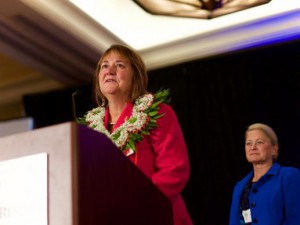
The Rev. Karen Oliveto. UMNS photo.
During the late spring and summer of this year, its work was made even more daunting by serial acts of ecclesial defiance regarding the church’s teachings and its ordination standards. Several annual conferences and two jurisdictions took actions in direct opposition to those reaffirmed by the General Conference. Chief among them was the Western Jurisdiction’s election of the Rev. Dr. Karen Oliveto as a bishop of the whole church. Oliveto, who now presides over the Mountain Sky Episcopal Area, is married to her female partner, who is a deaconess in the UM Church.
While people across the connection expressed their hopes and prayers for the newly appointed commission and its work, others offered mild to severe critiques of its composition.
“We feel erased and disappeared in the mission statement of the Commission,” wrote a group of more than 60 openly lesbian, gay, bisexual, transgender, queer or questioning United Methodist clergy and clergy candidates in a statement entitled, “United Methodist Queer Clergy Respond to Naming of Special Commission.” It noted that “only two self-identified LGBTQI persons” were selected as members, and protested that their “lives and the ministries entrusted to [them] will be on the agenda of a body whose make-up is unfairly hegemonic.”
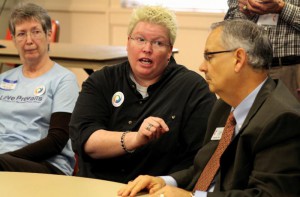
Rev. Amy DeLong
Love Prevails, a UM affiliated LGBTQ+ advocacy group, posted on its Facebook page that “the Commission is not representative of LGBTQ diversity, much less does it represent an LGBTQ majority,” something it pressed for earlier this summer. According to UMNS, the Rev. Amy DeLong, one of the organizations leaders, “found it ‘startling and unconscionable’ that there are no out lesbians or transgender individuals on the commission.”
Still others voiced support for the commission, but also had regrets. “It is problematic to include [caucus group] employees as voting members of the commission,” wrote the Rev. Jeremy Smith, a progressive blogger based in Portland, Oregon. “Their jobs are contingent on their caucus group boards, which is quite a collision of the role to discern a path forward that their boards may not approve of.”
Smith specifically cited Matt Berryman, president of the pro-gay advocacy group Reconciling Ministries Network, the Rev. Tom Lambrecht, vice-president of Good News, and Pat Miller, executive director of the Confessing Movement.
We’re biased of course, but we’re delighted Lambrecht and Miller were included on the commission. And while we differ with Berryman on a number of issues, we are not troubled by his inclusion as well.
Lambrecht and Miller have earned the respect of leaders across the theological spectrum. They have participated in numerous roundtable discussions, spoken at annual conferences, and have always respectfully engaged with those who are in disagreement with the church’s polity, sexual ethics, and teachings on marriage. We are confident they will only enhance the work of the commission, and will act out of conscience and their affection for the church.
Along with Berryman, Lambrecht and Miller represent important and dedicated constituencies in the church. A failure to include knowledgeable representatives from each of these groups would have immediately imperiled the commission’s chances of bringing forward a plan that could gain the broad support necessary for a way forward.
The commission’s charge is not an enviable one, and no one will be surprised if it cannot reach consensus and present a viable plan for the church’s consideration. The hour is late, so they will have to work thoughtfully and deliberately in the months ahead, and therefore the members deserve our thoughts and prayers.
We are disappointed it took the Council of Bishops five months to appoint the commission. We fear valuable time for deliberation and crafting recommendations has been lost. Even more importantly – and particularly in light of all the defiance, the approval of so-called “just resolutions,” the quiet dismissals of valid complaints, and the provocative election of Oliveto – the bishops’ delay further eroded the trust rank-and-file United Methodists have in their leadership and the institution as a whole.
Most, if not all, of the proceedings at General Conference, projected an alarming sense of institutional paralysis, and a disheartening sense that the long and acrimonious debate over the church’s sexual ethics, now amplified by routine and flagrant acts of ecclesial defiance, will go on indefinitely.
In a church facing a major demographic crisis in the coming decade, it is now imperative that its bishops act swiftly and boldly to maintain the good order and integrity of the church. No one doubts their faithfulness, passion for the church, and commitment to building bridges to keep the church unified. However, as laudable as all those attributes are, the necessity of finding consensus around a definitive resolution, and the courage to lead is what they need most to exhibit in the coming months.

by Steve | Oct 26, 2016 | Magazine, Magazine Articles, Sept-Oct 2016

Rev. Rob Renfroe
By Rob Renfroe-
Many people were shocked, actually offended, when Dr. Ted Campbell told the World Methodist Conference, “The question at this point is not whether we divide or not. That, I fear, is a given now.” A United Methodist elder and noted history professor at Southern Methodist University’s Perkins School of Theology, Campbell told a large crowd gathered in Houston, Texas, on September 1, that it is unlikely that the denomination can hold together.
Such admissions are not usually made in public, especially by persons of Dr. Campbell’s stature. However, behind closed doors, others representing The United Methodist Church are making the same prediction. One bishop told me that coming out of the bishop’s commission, “There will be some kind of structural separation. I hope we can maintain some connection around our central mission of making disciples, but structural separation will be the end result.”
Another bishop was even more blunt in his remarks to me: “We may be able to maintain some kind of connection, but the structural separation that will occur as a result of the commission will be so different than where the church is today, that ten years ago it would have been referred to as schism.”
Several leading “centrist” pastors have come to the same conclusion. One put it simply, “I think separation is inevitable.” Another who had been a supporter of A Third Way was even more pointed in his remarks. “We all know we’re going to split. All this happy talk about staying together is just a bunch of nonsense.”
The election of the Rev. Karen Oliveto to the episcopacy has increased the likelihood that The United Methodist Church will not be able to remain in its present form. Though our Book of Discipline states that self-avowed practicing homosexuals may not serve in ordained ministry, Oliveto is legally married to her long-time partner, another woman. Still, the Western Jurisdiction chose her to become one of our newest bishops. This came on top of at least nine annual conferences and two jurisdictional conferences that have committed to not “conform or comply” with the parts of the Discipline they disagree with. This leaves many of our evangelical churches trying to maintain what Methodism has always been in parts of the country where the church has left them.
The response has been predictable. Some churches are withholding their apportionments and others have retained legal counsel to determine how they might leave the denomination. The election of the Rev. Gene Robinson as bishop by the Episcopal Church set in motion a chain of events that led many Episcopal congregations to eventually create a new denomination, the Anglican Church in North America.
I take no joy in believing that there may be a separation within the UM Church, whether we maintain some connection or not. This is the church I love. This is the church where I found Jesus, or better, where he found me. This is the church that has nurtured and discipled me. And this is the church that has affirmed my gifts and my calling. And I will be forever grateful to The United Methodist Church.
I do not rejoice that we have arrived at this place. But I am hopeful that we are moving towards a new beginning.
I can see a new Methodist movement, either within the UM Church or, if it must be, outside of it.
It will be a movement that is not top down, but bottom up. One where boards and agencies actually serve the local church and are responsible to us. One where we are organized like a missional force that wants to change the world, not like a bloated bureaucracy.
I can see a movement where we don’t argue over the authority of Scripture or what the Bible teaches about sexuality. Where our seminaries prepare godly men and women to do ministry instead of being schools of religion where some faculty members don’t believe in our doctrines, and teach the latest theological fads that have no power to change the world and that will be forgotten within a generation.
It will be a movement that has freedom to plant evangelical churches on the coasts and in northern urban centers where people will still respond to the Gospel of Jesus Christ if it is presented by servant communities with grace and truth.
I can see a Wesleyan movement that cares about the rejected, the outcast, and the marginalized – cares about them enough both to minister to their physical needs and to tell them how their sins can be forgiven and their souls can be saved.
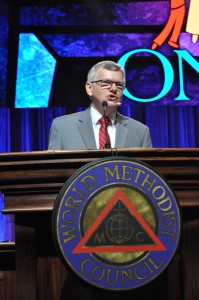
Dr. Ted Campbell. Photo courtesy of the World Methodist Council.
I can see a movement that you and I will be excited and proud to be a part of.
It will be a new Wesleyan expression for the 21st century. It will be filled with the power of God and the compassion of Christ that compels it into a lost world that needs Jesus.
There is a new day coming. And we are going to be a part of it. Those of you who are young will have decades to enjoy it and shape it and be blessed by it. Those of us who are older will one day before we die look back and say, “The Lord has done a new thing, and it was marvelous in our sight. And he was gracious enough to let us be a part of its beginning.”
Friends, my hope and my prayer is that we will walk into this new day together. This is no time to become discouraged or to grow weary. A better day is coming and it fills my heart with joy to think of us walking into it together for the glory of our Lord and Savior.
Rob Renfroe is the president and publisher of Good News.

by Steve | Oct 26, 2016 | Magazine, Magazine Articles, Sept-Oct 2016
By Courtney Lott-
Congratulations to Impact Church, Embrace Church, and New Covenant United Methodist Church for ranking among the fastest growing churches in the United States in the latest issue of Outreach Magazine.
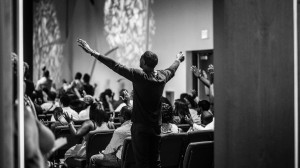 Impact Church
Impact Church
East Point, Georgia
Lead Pastor Olu Brown’s vision for a multicultural gathering of believers has come to pass at Impact Church. Striving to connect their community with God and each other, they work to redefine the church experience through “inclusiveness, relatable messages, energetic worship, relevant youth programs and impactful community outreach.” With two campuses in East Point, Georgia, Impact Church has grown rapidly since its inception in 2007.
They describe their mantra “doing church differently” as an action, a call to share God’s love with the world and to be part of a community that builds and strengthens those around them.
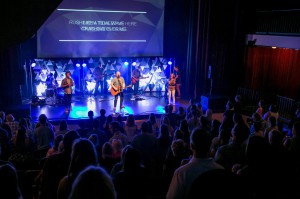
Photo by Bri Roegiers
Embrace Church
Sioux Falls, South Dakota
An initiative of Cornerstone (United Methodist) Church in Watertown, South Dakota, Embrace started with a simple worship service consisting of 32 individuals in 2006. Though uncertain of what might come of this gathering, this group followed the Lord’s call to offer the growing city of Sioux Falls another church. They grew quickly into what would become Embrace Church, welcoming new worshipers each month. Under the leadership of Adam Weber, this congregation has gone from meeting once a month in people’s homes, to six campuses, including one online. Striving to live up to their name, Embrace Church prays that they would draw people in as the father draws in the prodigal son.
In a welcome video on the Embrace website, Weber says, “Our hope is to truly encounter, the living God. That we wouldn’t just be a group of people who gather, but our intent would be greater than that, that we would encounter Him.”
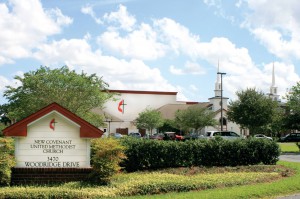
New Covenant United Methodist Church
The Villages, Florida
In Florida, New Covenant United Methodist Church is another one of the fastest growing churches in the United States. Led by Rev. Harold Hendren, the congregation sees welcoming others into a personal relationship with Jesus Christ as its highest calling. Striving to be the hands and feet of Christ, New Covenant serves their communities of Summerhill and Lake Denton, Florida, in a number of ways. Their ministries include grief and Alzheimer’s support, transportation services, and visitation.
“One of the things we really pride ourselves on here at New Covenant is that we really have a heart for serving the Lord and our extended community,” says Hendren in a welcome video to their website. “It’s good to be able to serve the Lord together as brothers and sisters in Jesus Christ.”
Courtney Lott is the editorial assistant at GOOD NEWS.

by Steve | Oct 26, 2016 | Magazine, Magazine Articles, Sept-Oct 2016
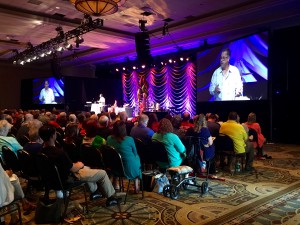
United Methodists with Aldersgate Renewal Ministries gathered in Lexington, Kentucky, for their July event. Photo by Steve Beard.
There is a spiritual stirring within United Methodism. In the midst of chaotic and difficult times for our denomination, there is a simultaneous movement calling for a renewal of our minds and hearts. In addition to the launch of the Wesleyan Covenant Association, we are grateful for ministries seeking to stoke the embers of revival within United Methodism.
In July, more than a thousand United Methodists involved with Aldersgate Renewal Ministries gathered at their National Conference on Spirit Filled Living in Lexington, Kentucky. In addition to energetic plenary sessions, the conference has played host to seminars on topics such as Discerning the Voice of God, Spiritual Healing in a Local Congregation, Baptism in the Holy Spirit, Miracles, Raising the Dead throughout History and Today, Celebrating God in the Dance, and The Supernatural Thread in Methodism.
“The Aldersgate renewal movement gives me hope for the future of Methodism in North America,” says Dr. David Watson, academic dean and professor at United Theological Seminary in Dayton, Ohio. “Every year we gather together in one place to worship God, be filled with the Holy Spirit, and build one another up in the faith. It is one of the most life-giving things I have ever been a part of. They also have training and renewal programs for local churches to assist them in discerning and receiving the work of the Spirit. Whatever else is going on in The United Methodist Church, ARM helps me to keep the main thing – our salvation in Jesus Christ – the main thing.”
In September, more than 1,500 brothers and sisters attended Seedbed’s New Room Conference in Franklin, Tennessee. It was a great time to join our hearts with other Wesleyans across denominational spectrums that want to see revival in our nation and around the world. God was at work! There is a stirring in the hearts and minds of United Methodists for a fresh touch from heaven.
“New Room has created quite a problem for itself,” observed the Rev. Elizabeth Glass Turner, Associate Director of World Methodist Evangelism. “The second year of its existence, New Room’s attendees were twice the number of its inauguration. This year, it doubled in size again. What was it Jesus said about the Kingdom of God being like yeast? Because the bread of New Room is rising. Sowing for a great awakening, indeed.”
The breakout sessions put a whole new spin on Family Discipleship, Freedom in Christ, John Wesley on the New Birth, How to Reach the Unreachable, Welcoming the Holy Spirit, Healing Sexuality, Lay Mobilization, The Power of Prayer, Global Missions, Participating in the Great Awakening, Faith Formation in a Postmodern World, Sharing the Gospel in a Skeptical Age, Finding Meaning in Your Calling, the Future of American Methodism, and Increasing Your Church’s Missional Outreach.
Pray for revival.
–Good News

by Steve | Oct 26, 2016 | Magazine, Magazine Articles, Sept-Oct 2016
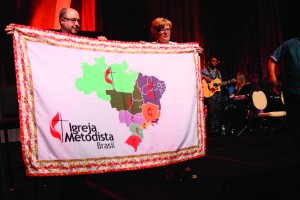
Photo courtesy of World Methodist Council.
By Sam Hodges-
There’s no better place than a World Methodist Conference to witness the scattered seeds and deep roots of John Wesley’s approach to Christianity. Some 2,500 Wesleyan faithful, from 108 countries and 88 communions including The United Methodist Church, met in Houston for the 21st such gathering.
“John Wesley said the Methodists are one people throughout the world,” said United Methodist Bishop Scott Jones, who as newly assigned Texas Conference episcopal leader offered greetings at an August 31 opening service. “It’s in this conference, as we gather together from so many different places, that that unity becomes visible.”
The World Methodist Conference is a once-every-five-years meeting of the World Methodist Council, an association of 80 Methodist, Wesleyan, and related United and Uniting churches, representing 80.5 million people.
The opening service may not have had Olympics-level choreography, but it did have a stirring parade of denominational banners — carried by groups from Nepal, Nigeria, and New Zealand, to name a few — as the crowd sang Charles Wesley’s “O For a Thousand Tongues to Sing.”
Greetings were given by Jones, but also by Bishop Vashti Murphy McKenzie of the African Methodist Episcopal Church and Senior Bishop Lawrence Reddick III of the Christian Methodist Episcopal Church, who oversee Texas churches for their denominations.
Prayers came from Bishop Paulo Lockmann, president of the World Methodist Council and a leader of the Methodist Church in Brazil, and from Archbishop Michael Kehinde Stephen, of the Methodist Church Nigeria. The music, led by Jorge Lockward of the United Methodist Board of Global Ministries, ranged from gospel to South American flutes to traditional church choir numbers, and included the crowd singing “How Great Thou Art” in their own languages.
For the Rev. Emerson Castillo, the opening service alone justified his journey from El Salvador. “I feel I understand how God can move between all of us even in our diversity and differences and cultural backgrounds,” said Castillo, who works for the Council of Evangelical Methodist Churches of Latin America and the Caribbean and leads a church in El Salvador. “Even though there were many languages represented, the spirit guided us as one church.”
Astrophysics and Psalm 8
The World Methodist Conference, in contrast to The United Methodist Church’s General Conference, is not about legislation, budgets, and other forms of church politics. Instead, it’s an occasion for people of the Methodist tradition to be together. The event featured daily worship services and teaching in a variety of formats.
For the opening worship, a conventional sermon was replaced by a dialogue between astrophysicist Jennifer Wiseman, a member of Deer Park United Methodist Church in Reisterstown, Maryland, and David Wilkinson, a scientist-turned-theologian teaching at St. John’s College, Durham University in England.
They rooted the talk in Psalm 8 (“When I consider thy heavens, the work of thy fingers, the moon and the stars, which thou hast ordained …”) but also projected images of distant galaxies and emphasized how the latest research underscores the vastness of the universe.
“I glean from this that the God we pray to is awesome,” said Wiseman. Wilkinson argued that Christians should welcome, not feel threatened by, the fast march of science. “It’s a gift to liberate; it’s a gift to heal; it’s a gift to instill in us awe and wonder,” he said.
Roots and relevance
The Rev. Rudy Rasmus, pastor of St. John’s United Methodist Church in Houston, touched on the segregation of his youth, the pace of technological change, and the need for the church to love sincerely, energetically, and without precondition if it’s going to avoid obsolescence.
He recalled how he came to faith well into adulthood at Houston’s Windsor Village United Methodist Church, thanks to the embrace of its pastor, the Rev. Kirbyjon Caldwell, and the congregation. “I could care less what the Book of Discipline said in that moment. What I really wanted to know was, ‘Do you love me?’” Rasmus said. But Rasmus, recalling how the local zoo was more welcoming than white churches in his youth, also challenged the audience to seek justice as it loves. “Love should be creating a disruption in your part of the world,” he said.
Professor fears church division is ‘a given’
The World Methodist Conference is, by and large, a feel-good event. But this one took a somber turn when one speaker frankly addressed the schism threat in The United Methodist Church over the issue of homosexuality.
The Rev. Ted Campbell, a United Methodist elder and professor at Southern Methodist University’s Perkins School of Theology, argued in his September 1 plenary address that the denomination cannot hold together. “The question at this point is not whether we divide or not,” said Campbell, standing under a “One” sign that signified the unity theme of the conference. “That I fear is a given now.”
Campbell’s talk brought a response from United Methodist Bishop Bruce R. Ough, president of the United Methodist Council of Bishops. The council was, at the direction of the 2016 General Conference, preparing to name a commission to study and consider revisions in church policies on homosexuality. “I think it’s helpful to have voices that are being realistic about how divided we are,” Ough said in an interview after Campbell’s talk. “At the same time, I believe it’s important that we not start the work of the commission making assumptions that we’re already divided and there’s no way back.”
Essentials and non-essentials
Campbell used much of his talk for what amounted to a church history lesson, rooted in the old saying (often incorrectly attributed to John Wesley, he noted) that a church should have “in essentials unity, in non-essentials liberty, in all things charity.” Rupertus Meldenius, the 17th century Lutheran who introduced the phrase, meant the church should have unity in necessary beliefs, flexibility in other beliefs, and a charitable attitude regarding both.
Campbell noted that a large majority of delegates to recent United Methodist General Conferences have voted to uphold restrictive church law regarding homosexuality. “So this matter now has the functional status of an ‘essential’ or ‘necessary’ teaching alongside the teachings of the ancient church and the Reformation and the Wesleyan movement as something that unites and divides us,” he said.
Campbell pointed out that some United Methodist annual conferences disagree so strongly with church law on homosexuality that they have passed non-conformity resolutions. That includes ignoring the restriction against ordaining “self-avowed practicing” gay clergy. “When annual conferences declare that they will not follow the law of the church, I think that is in fact a division,” Campbell said.
Though his talk was scholarly, Campbell shared a story about a Perkins student whom he described as the school’s academic star and one whose commitment to prayer exceeded Campbell’s own and that of most other faculty. But the man eventually left school, understanding that his homosexuality would prevent his ordination in The United Methodist Church. “These problems are not hypothetical,” Campbell said. “They take the form of real human beings.”
Campbell asked the World Methodist Conference audience to pray for The United Methodist Church and offer it counsel and other support.
God’s imagination
Ough said he approached Campbell — his friend for years — after the address to counter the view that the denomination can’t hold together. “I think it’s far more helpful, and also far more faithful, to assume that God’s imagination is greater than our impoverished imagination, and that if we surrender to that we might discover ways to be together that might look different, but nonetheless continue and affirm our unity,” Ough said.
Lyon wins Peace Award
One highlight of the conference’s last day was the presentation of the World Methodist Peace Award to the Rev. Jo Anne Lyon. She’s a former general superintendent of The Wesleyan Church denomination, but the award recognized her as founder and longtime leader of World Hope International.
She started that nonprofit in her home, and under her leadership, it grew into a major Christian relief and development agency, now working in 30 countries. The group has focused on bringing clean water and spiritual nourishment to communities, as well as providing holistic healing programs for post-war amputees.
Lyon herself has worked to raise awareness of human trafficking, and she represented her denomination on President Obama’s Advisory Council on Faith-Based and Neighborhood Partnerships.
“Seeking justice alone can become all political,” Lyon said. “But righteousness without seeking justice for others leads to isolation from the world. We find that balance including both justice and righteousness, rooted in the Bible and in our historical identity.”
In her plenary address, Lyon noted the power inherent in the 80.5 million people represented in the 80 Methodist, Wesleyan, and related United and Uniting groups that are part of the World Methodist Council.
“Eighty million of us. That’s a lot of folks, people!” she said. “And God can do a lot with us. And if we can get focused on the mission and vision God has for us, literally at this time in history the world can be turned upside down.”
Sam Hodges, a United Methodist News Service writer, lives in Dallas.










